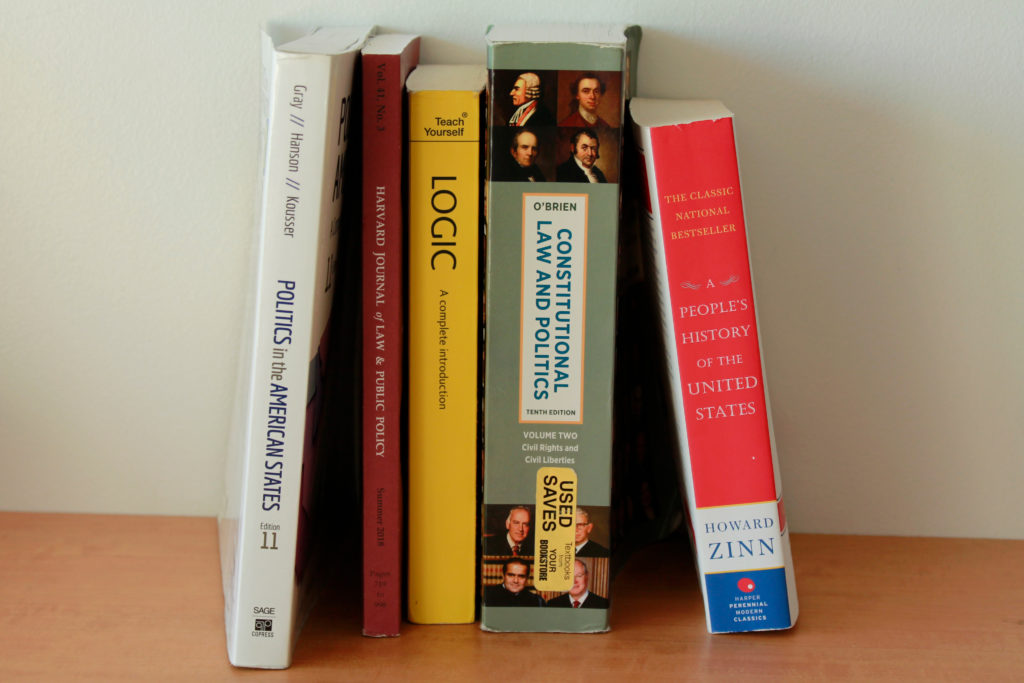The University is transitioning to open source materials as part of a push to ease the burden of high textbook costs many students face.
Some professors have started providing free class materials in their own curriculum, coinciding with a grant for faculty to start using free open-source learning materials next year. Officials are also paying students through a “buy back” program to alleviate GW’s $1,400 annual projected textbook cost as part of a broader push to make class materials more affordable.
University spokesperson Crystal Nosal said the GW Campus Store’s textbook buy back program, which purchases used textbooks from students at lower costs, has distributed more than $30,000 to students and has saved students nearly $319,000 dollars on used textbooks since last April.
Geneva Henry, the dean of GW Libraries and Academic Innovation, said GW Libraries created the Adapting Course Materials for Equity Grant this spring to award professors for transitioning their instructional materials to GW Libraries’ open-source database, which provides free access to a variety of academic resources like textbooks and newspaper articles. She said GW Libraries will start distributing the grants later this semester.
“If you make it open, you benefit everybody out there,” she said. “And it’s the same thing for everybody else that’s creating open access materials and open education resources is, let’s go use those because they are available to us.”
Some faculty said they are already providing free materials for their students to make their courses more equitable and accessible to students who may not be able to afford the large price tag that comes with buying textbooks. Textbooks in the bookstore range from $10 to more than $100.
Dana Burton, a doctoral candidate for anthropology, said anthropology curricula are flexible, which has helped lower costs because free textbooks were available online and through GW Libraries and could be applied to her course when she designed it earlier this year.
Burton said her curriculum includes articles, interviews, videos, soundtracks and chapters from books relating to the course. She said she estimates the texts she got for free from Gelman Library would have cost between $20 and $40, and the free articles from Gelman would have ranged between $30 and $50.
Burton said she once decided against including a book in the curriculum because she wanted to keep the course materials free. She said she was able to find new materials after seeking them out through bibliographies from books and articles she is familiar with or from scholars who she knows have expertise in the subject.
“I did a lot of research on what text to include,” Burton said. “I found out that several scholars who have books that were very similar to the ones that I wanted to teach were offering all of their material and their publications for free on their websites, which is amazing.”
Aman Luthra, an assistant professor of geography, said he can assign online articles in his more flexible classes that he can design on his own, like human geography, which has an evolving body of literature. He said he provides students with book chapters and articles in PDF form he found online for free.
“What I do hear from students is a sense of appreciation that I didn’t make them buy a textbook for the course,” he said.
Luthra said Columbian College of Arts and Sciences leaders has sent multiple emails encouraging professors to try to use materials that don’t cost students money.
”I always get emails from the administration asking us to consider using either open-source textbooks or other materials,” Luthra said.
Margaret Ulfers, a teaching assistant professor of epidemiology, said she doesn’t use a textbook for her Introduction to Epidemiology class because she felt there weren’t any textbooks that students would find helpful after the course ends.
“If a textbook is good, I think it’s really worth it,” Ulfers said. “I do, however, try to avoid having students pay for a textbook that’s not that good or isn’t going to give them something more than they could get.”
Student advocacy, including a Student Association resolution passed last semester outlining plans to establish a textbook exchange program, has pressured officials to reduce the cost of textbooks for students in recent years.
SA Sen. Gabriel Young, CCAS-U and the sponsor of the SA resolution, said one of his professors has scanned, copied and uploaded textbooks for students to use online and another offered open-source articles that students could access for free. He said as part of the textbook exchange program, in the upcoming weeks he will release a social media post and an online sign-up sheet for students to start trading their textbooks.
“Textbooks are just so expensive,” he said. “So by professors actually making these books free and accessible and providing PDF copies or links to download them, it provides students the opportunity to save money and cut costs for themselves that they may not have.”







